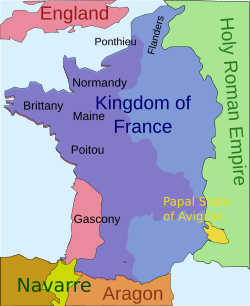Anglo-French War (1294–1303) facts for kids
Quick facts for kids Anglo-French War 1294-1303 |
|||||||
|---|---|---|---|---|---|---|---|
 France in 1328 |
|||||||
|
|||||||
| Belligerents | |||||||
| Commanders and leaders | |||||||
The Anglo-French War was a big fight between the Kingdom of England and the Kingdom of France. It happened in two main parts: from 1294 to 1298, and then again from 1300 to 1303. The main reason for the war was a disagreement over a region in France called Gascony. The war finally ended with the Treaty of Paris (1303).
Contents
The Anglo-French War (1294-1303)
Why the War Started: Aquitaine and Gascony
A serious problem began in 1293. There were fights between French and English sailors. Because of this, Philip IV of France, the King of France, called his English "vassal" (meaning a ruler who owes loyalty to another, in this case, King Edward I of England for his lands in France) to a meeting called Parlement.
As part of a deal, French soldiers took control of some castles in Gascony. But they didn't give them back to the English when they were supposed to. So, Edward I of England, the King of England, decided he would no longer show loyalty to the French King for these lands. He got ready to fight for Aquitaine, which included Gascony.
The war that followed, from 1294 to 1303, mostly went well for Philip IV. His armies pushed deep into Gascony.
Fighting in Flanders
King Edward I of England fought back by making friends with Flanders and other northern princes. Flanders was a rich area known for its cloth. In August 1297, Edward started a military campaign there with the Count of Flanders.
However, they were defeated by a French army led by Robert II, Count of Artois. After this, a truce (a temporary stop to fighting) was agreed upon from October 1297 to 1303. During this time, both kings went back to how things were before the war started.
The peace treaty in 1303 seemed to solve things for a bit. It gave the duchy (the land) back to King Edward. But he still had to show loyalty to the French King for it. This situation still had the potential for more conflict later on.
One big result of this first war was that Flanders became very disobedient to France. After the Count of Flanders was captured and put in prison, the people of Flanders, especially the townspeople (called burghers), rebelled against the French soldiers. The French knights suffered a terrible defeat at the Battle of Courtrai in July 1302.
After that, the situation changed. But it wasn't until 1305 that a lasting agreement could be reached that satisfied the French king.
What Happened Next
During this time, fighting wars cost kings a lot of money and resources. Gascony was important because it also provided soldiers. So, no English king could afford to let France take over Gascony. Too much was at stake for them.
The English Kings, as Dukes of Aquitaine, were supposed to be loyal to the French King. This mix of who was in charge and who had the right to rule often caused arguments. It might seem strange that a bigger war didn't happen sooner because of Gascony. But for many years, the problems over England's land in Gascony were kept under control.
This war was a turning point in how England and France got along. It showed that the tensions between them were growing.
 | Ernest Everett Just |
 | Mary Jackson |
 | Emmett Chappelle |
 | Marie Maynard Daly |

